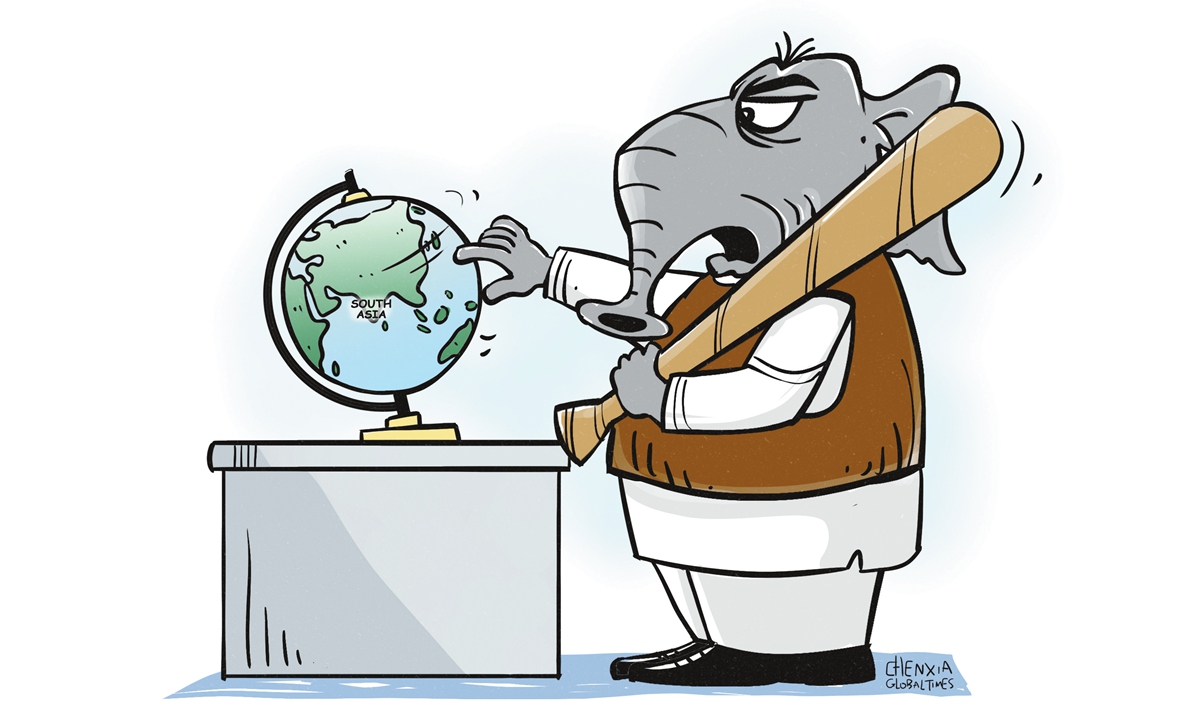
Illustration: Chen Xia/GT
Anura Kumara Dissanayake was sworn in as the new president of Sri Lanka on Monday after the National People's Power leader won the presidential election. This marks the first time in the country's history that a Marxist leader has assumed the role.
Some Indian and Western media outlets have been quick to nervously analyze Sri Lanka's possible attitude toward India. Media outlets like the Times of India and Deccan Herald have noted that the Janatha Vimukthi Peramuna (JVP), also led by Dissanayake, has an "anti-India record and pro-China leaning." To drive a wedge between China and Sri Lanka, the Indian Express even made an issue of Sri Lanka's debt problem, claiming "India has been a willing partner to Sri Lanka's debt restructuring, unlike China."
India's concerns and attempts to undermine China-Sri Lanka relations over so-called debt traps reflect a great power competition mind-set, exposing its regional hegemonic ambitions and worries about the decline of its influence in South Asia, Long Xingchun, a professor from the School of International Relations at Sichuan International Studies University, told the Global Times.
India has long viewed South Asia as its sphere of influence, insisting that countries in the region adhere to an "India first" policy. However, such a hegemonic mind-set does not align with the interests and development needs of South Asian countries such as Sri Lanka, the Maldives, Bangladesh, Nepal and Bhutan. What these nations most need is to strengthen themselves and improve their economies, and cooperation with China is undoubtedly a favorable choice.
Sri Lanka was one of the first countries to welcome and join the China-proposed Belt and Road Initiative (BRI). Port City Colombo and the Hambantota Port, which are flagship projects under the BRI cooperation framework, have significantly promoted Sri Lanka's economic development and improved living standards, facilitating the country's modernization process. Clearly, a win-win approach is the direction in which people are inclined to move.
Normal, healthy and sound state-to-state relations can only be built on mutual respect, equality and mutual benefits. Just as Chinese President Xi Jinping said when congratulating Dissanayake on assuming the presidency of Sri Lanka on Monday, China and Sri Lanka have set a good example of friendly coexistence and mutually beneficial cooperation between countries of different sizes.
"Attempts to hinder South Asian countries from collaborating with others through smear tactics are unhealthy, impractical and unlikely to succeed," said Long.
Since the British Empire's withdrawal from South Asia after World War II, South Asian nations have developed into modern nation-states, with the concept of sovereign equality taking root. No country wishes to accept being in India's sphere of influence, nor do any political elites in neighboring countries willingly subordinate themselves to New Delhi. India's anxiety over Sri Lanka's election results, its various unfounded worries about Sri Lankan diplomacy, and its attempts to undermine China-Sri Lanka relations stem from its perception of itself as the sole regional hegemon, which burdens it excessively.
Recent years have witnessed the emergence of an "India Out" campaign among South Asian countries, which is a result of India's mistaken policies and mind-set of treating South Asia and the Indian Ocean as its sphere of influence.
Experts suggest that, as an independent sovereign state, maintaining its own interests is paramount for the Sri Lankan government, which is expected to continue a balanced diplomatic approach. As Dissanayake pointed out in an interview, "Sri Lanka won't be a competitor in that geopolitical fight, nor will we be aligned to any party. We don't want to be sandwiched, especially between China and India. Both countries are valued friends."
India's anxiety only reveals its petty mind-set. As a regional power, India should respect Sri Lanka's sovereignty and the foreign development choices it makes based on its own interests. It should refrain from its hegemonic impulse to exert pressure on or interfere in Sri Lanka's external cooperation.




